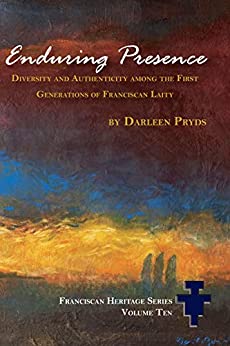The Pilgrim’s Companion: Sharing the Franciscan Journey
Francis and Lady Jacopa: A Counter Cultural Friendship
By Darleen Pryds, PhD

Artist: Howard Schroeder, SFO
The path of Franciscan spirituality is a counter cultural path of emptying oneself to be filled with Christ. We usually associate it with voluntary poverty. So, how is it that one of the women who traveled along this was one of the wealthiest and most powerful women of Rome: Jacopa dei Settesoli? How does wealth and power translate into a faith journey that bears the label, “Franciscan?”
Through a path that is counter cultural even to Franciscans!
We often associate Jacopa with the almond cookies she’s known to have made for Francis, but I think her significance to the tradition is far deeper. Jacopa invites us to consider more deeply the nuances of what it means to be Franciscan and to adopt this faith that makes us counter cultural.
While we don’t know a great deal about Jacopa’s life, we do know that she was thrust onto her path of spiritual transformation involuntarily when her husband was killed around 1211. Still a young woman with at least two young children, Jacopa was expected to remarry in order to retain the power dynamics her own family of origin held as did the family she had married into. Political power, economic primacy, and social prestige were at stake.
In her first counter-cultural act, Jacopa refused to remarry. This led to her second counter-cultural act: she retained full control over the estate that she inherited from her husband. In addition, she guaranteed full control over the estate even upon her sons’ reaching adulthood: a third counter cultural act.
But didn’t this just bring Jacopa into power, wealth, and prestige herself?
It could have, but around 1212 she met Francis of Assisi. While we don’t know how they met or how their relationship deepened, we know that Jacopa began to dispense of her wealth and to use her political power in ways that were unusual for her family. She gave Francis and the friars their first church in Rome, San Francesco a Ripa (located today on Via Jacopa dei Settesoli). She broke with family tradition and negotiated a peace treaty with the papacy that ended a longstanding feud between her family and the pope. In short, she used her wealth, power, and social standing in new ways that drastically altered her family’s traditional conduct.
While it remains undocumented how her relationship with Francis developed, we know it grew into rare intimacy…not the romantic kind. And no, not the sexual kind, either. But the spiritual kind. The rare kind of intimacy that makes you know something serious is about to happen to someone you love even though you’re physically miles apart.
Have you ever experienced that? You had a sense that something was wrong or you were needed somewhere for
someone? It’s more than a hunch. It’s a real knowing.
Such was the intimacy between Francis and Jacopa.
When he was dying and thought to send a messenger to bring her to him, she intuited his need for her during a period of prayer, and traveled with her full retinue prepared for the woman’s work of caring for the dying and the dead: with candles, a fresh tunic, a shroud, incense, and of course, the makings for the almond cookies he had loved so much. Such closeness between Francis and a woman was singular. Even Clare was not as close to Francis as Jacopa. So, it makes sense that the friar minding the door to the Portiuncula would question her coming into the space where Francis lay dying. Francis’ response? “Let her in. She’s well known to me and to us. I trust her. Let her in.” His was an unexpected response, to be sure, since he put aside the longstanding rules against a woman’s presence. But the rule no longer served. And Francis wanted his friend to care for him and to be present.
We can get perhaps a little too focused on the cookies when we think of Lady Jacopa. Perhaps the real gift of the story of Jacopa and Francis is one of counter cultural presence: to allow real intimacy, against all odds.
About our writer:
Dr. Darleen Pryds is a professor of History and Christian Spirituality at the Franciscan School of Theology. Since a freshman in college, she has studied Franciscan history, quickly gravitating toward lay experiences in the tradition. She’s written several books and articles on lay Franciscans some of which can be accessed and downloaded through Academia.edu In her spare time Darleen serves as a volunteer hospice caregiver. For fun she enjoys hiking with her husband, Scott, and their dog, Gioco. She can be reached at dpryds@fst.edu
Darleen will be co-facilitating a pilgrimage with Jean-François Godet-Calogeras on Franciscan Spirituality as a Counter Cultural Path with a special focus on laity in October, 2023. If you are interested in information about the pilgrimage, reach out to Darleen or Franciscan Pilgrimage Programs.

Credit: Franciscan Pilgrimage Programs February- 2022

